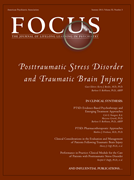Prevention and Early Intervention: PTSD Following Traumatic Events
Abstract
Posttraumatic stress disorder (PTSD) is often a chronic condition that has a significant impact on the individual and society. In attempts to prevent the disorder for those at risk, researchers have explored predictors of PTSD with limited success. As an alternative, early treatment options have been developed and are reviewed here, including pharmacological approaches and psychosocial interventions. While few early interventions or predictors have been shown to be consistently efficacious, recommendations are provided for future research building on recent promising findings in biomarkers, pharmacotherapy, and exposure-based psychotherapy interventions.



